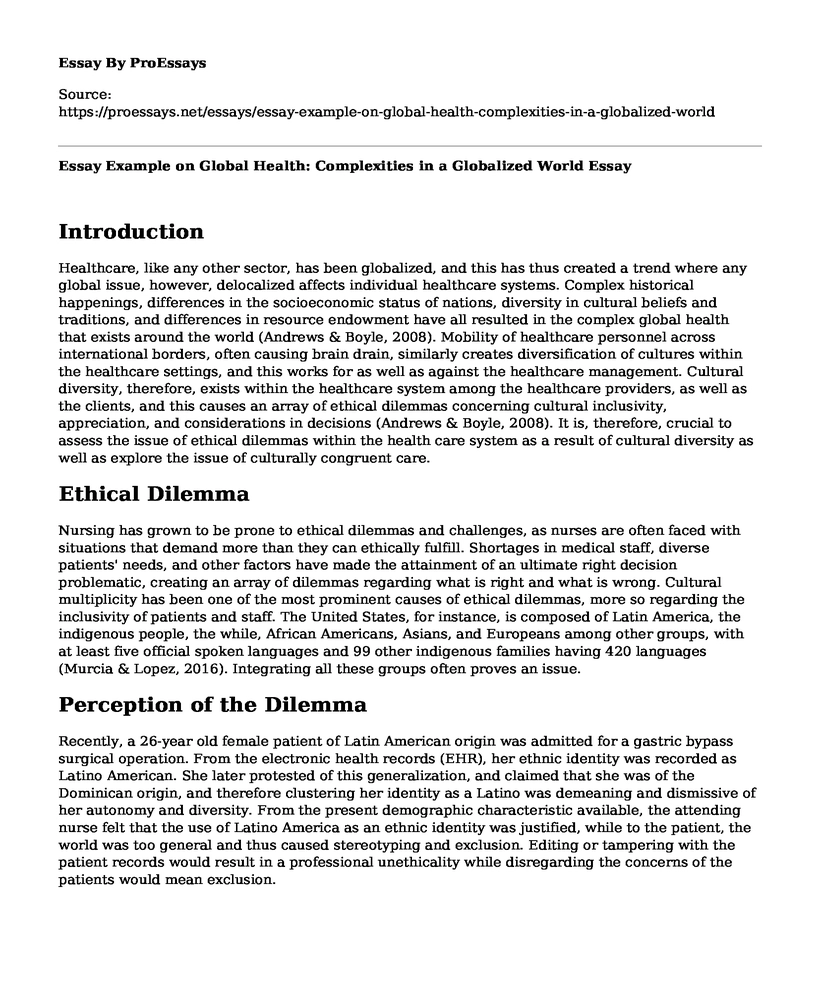Introduction
Healthcare, like any other sector, has been globalized, and this has thus created a trend where any global issue, however, delocalized affects individual healthcare systems. Complex historical happenings, differences in the socioeconomic status of nations, diversity in cultural beliefs and traditions, and differences in resource endowment have all resulted in the complex global health that exists around the world (Andrews & Boyle, 2008). Mobility of healthcare personnel across international borders, often causing brain drain, similarly creates diversification of cultures within the healthcare settings, and this works for as well as against the healthcare management. Cultural diversity, therefore, exists within the healthcare system among the healthcare providers, as well as the clients, and this causes an array of ethical dilemmas concerning cultural inclusivity, appreciation, and considerations in decisions (Andrews & Boyle, 2008). It is, therefore, crucial to assess the issue of ethical dilemmas within the health care system as a result of cultural diversity as well as explore the issue of culturally congruent care.
Ethical Dilemma
Nursing has grown to be prone to ethical dilemmas and challenges, as nurses are often faced with situations that demand more than they can ethically fulfill. Shortages in medical staff, diverse patients' needs, and other factors have made the attainment of an ultimate right decision problematic, creating an array of dilemmas regarding what is right and what is wrong. Cultural multiplicity has been one of the most prominent causes of ethical dilemmas, more so regarding the inclusivity of patients and staff. The United States, for instance, is composed of Latin America, the indigenous people, the while, African Americans, Asians, and Europeans among other groups, with at least five official spoken languages and 99 other indigenous families having 420 languages (Murcia & Lopez, 2016). Integrating all these groups often proves an issue.
Perception of the Dilemma
Recently, a 26-year old female patient of Latin American origin was admitted for a gastric bypass surgical operation. From the electronic health records (EHR), her ethnic identity was recorded as Latino American. She later protested of this generalization, and claimed that she was of the Dominican origin, and therefore clustering her identity as a Latino was demeaning and dismissive of her autonomy and diversity. From the present demographic characteristic available, the attending nurse felt that the use of Latino America as an ethnic identity was justified, while to the patient, the world was too general and thus caused stereotyping and exclusion. Editing or tampering with the patient records would result in a professional unethicality while disregarding the concerns of the patients would mean exclusion.
Conflicting Values and Belief Systems
Decades ago, there was no particular term that could describe the people of Mexican origin in the United States. Progress was thus spotted when worlds such as Mexican-Americans, Hispanics, Latin Americans, and Latinas or Latinos were used to describe them. The identity of this culturally diverse has often been mistaken and misunderstood. The use of Latinx as the new identity encompasses the challenging of the binary gender restrictions in this cultural group and thus the eradication of marginalization and violence created by the various terms used to describe them (Vidal-Ortiz & Martinez, 2018). Latinx, therefore, seeks to foster inclusivity in terms of ethnic diversity, gender and sexual nonconformity in the Latin American group.
Missing Elements
The attending nurse was thus uninformed or somewhat misinformed concerning the diverse identities of the Latinx community. While the federal or state demographic data present this group as Latinos, it is up to the nursing community to be updated and thus incorporates inclusive adjustments in their interactions with people of varied cultures.
Culturally Congruent Care
Patients bring a variety of cultured within the healthcare sector. It is often up to the medical personnel to accommodate these differences through cultural competence and congruence. Cultural congruence refers to the practical and balanced interactions between the healthcare provider and the client. Culturally congruent care thus entails the supporting, enabling, and facilitative actions and decisions that are coined to fit the culturally diverse needs of the client and the provider and therefore result in beneficial and satisfactory care and services (Cuevas, O'Brien, & Saha, 2017). It thus created a balance between cultural diversity, awareness, and appreciation.
In conclusion, cultural diversity has proved to be a critical aspect of the healthcare system. As an asset, it can be used to promote the diversification of care, and as a liability, it could act as a barrier against competence and inclusion. It often results in ethical dilemmas. To resolve this, culturally congruent care is paramount.
References
Andrews M. M. & Boyle J. C. (2008). Transcultural concepts in nursing care. Fifth edition. Lippincott Williams & Wilkins.
Cuevas, A. G., O'Brien, K., & Saha, S. (2017). What is the key to culturally competent care: Reducing bias or cultural tailoring? Psychology & health, 32(4), 493-507. doi:10.1080/08870446.2017.1284221
Murcia, S. E., & Lopez, L. (2016). The experience of nurses in care for culturally diverse families: A qualitative meta-synthesis. Revista latino-americana de enfermagem, 24, e2718. doi:10.1590/1518-8345.1052.2718
Vidal-Ortiz S. & Martinez, J. (2018). Latinx thoughts: Latinidad with an X. Latino Studies 16(3). Pp. 385-395. DOI: 10.1057/s41276-018-0137-8
Cite this page
Essay Example on Global Health: Complexities in a Globalized World. (2023, Mar 02). Retrieved from https://proessays.net/essays/essay-example-on-global-health-complexities-in-a-globalized-world
If you are the original author of this essay and no longer wish to have it published on the ProEssays website, please click below to request its removal:
- Essay Example: Role of World Health Organization in Public Health
- Syphilis and Confidentiality Essay
- Ankle Injuries for Dancers
- U.S. Marijuana Use: Federal vs. State Laws - Research Paper
- Essay on Community-Based Nursing: A Catalyst for Quality Care and Improved Outcomes
- Essay Sample on Giving Back to the Community: My Experience with Habitat for Humanity Services
- Essay Example on Fragmentation in US Healthcare System: Effects and Examples







